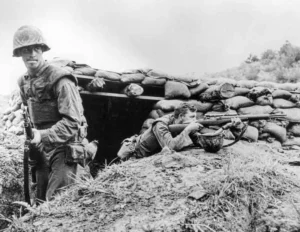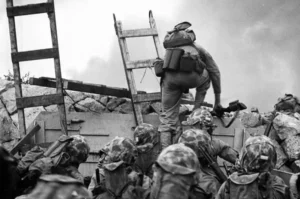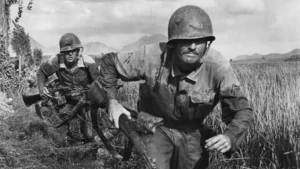This summer, the 70th anniversary of the Korean War armistice was observed aboard the USS Midway Museum. In addition to being America’s first Cold War conflict in Asia, the fighting in Korea played a dramatic role in the very survival of the United States Marine Corps.
The North Korean invasion of South Korea on June, 25, 1950 caught the U.S. government off guard. They sent in the military in an attempt to repulse it. Unfortunately, the American units were ill-equipped for the mission, which led to humiliating retreats, and U.S. airpower was incapable of stemming the communist onslaught.
The reasons for these battlefield embarrassments were due to U.S Army General Douglas MacArthur’s neglect of the forces he commanded in Japan, and the draconian defense cuts made following World War II by an antagonistic President Harry Truman. The Army was under-strength and under trained using aging equipment; the Air Force now devoted itself primarily to delivering the atomic bomb to the neglect of the continual development of tactical air power; and the Navy was a fraction of its 1945 size, barely retaining carrier aviation and with only one aircraft carrier on patrol in the Far East.

Caught up in the turbulence of this post-1945 downsizing, the U.S. Marine Corps was fighting for its very existence. An ardent supporter of military unification, Truman staunchly encouraged the Army to propose downgrading the Marine Corps to a nothing more than naval constabulary. While resolute congressional support at the end of World War II thwarted those plans, the Corps was on notice that they had no friend in the president.
By 1947, with the Department of Defense now formally established, the Marines learned that the Army had consigned them the mission of amphibious warfare, along with restrictions on the force strength, and gave them no place on the Joint Chiefs of Staff.
While the combat readiness of the other services faltered, the Marines at least succeeded in retaining a high number of combat veterans and maintained tough standards for new recruits. By the start of the Korean War, the U.S. Marine Corps was really the only competent fighting force America could bring to the table.
Unlike the substandard Army units rushed into Korea from undemanding occupation duty in Japan, the Marines arrived at full strength, with new equipment, including heavy M-26 Pershing tanks, and its own organic air support. More importantly, the Marines arrived with World War II combat veterans and motivated younger ranks.

After a harrowing Army retreat from central South Korea in late summer 1950, Army Gen. Walton Walker saw an opportunity to use fresh Army units and the Marines to counterattack and destroy the North Korean divisions.
The Marines drove miles into enemy territory, even overrunning a North Korean divisional headquarters while a parallel Army advance on the Marine’s right bogged down with its road-bound rear elements under attack. While the operation was ultimately called off, the Marine air support devastated an entire North Korean motorized unit.
Miles north, yet another sector was in jeopardy. Gen. Walker finally had to call upon the Marines again to restore the line, and after two days of stiff fighting, the systemic application of firepower and aggressive assault by the Marines wrecked a newly-arrived North Korean division.

Despite the Army’s embarrassing setbacks and the Marines battlefield triumphs, Truman continued to criticize the Corps. “The Marine Corps is the Navy’s police force,” said the president in response to a suggestion that the Marine Corps be expanded, “And as long as I am president, that is what it will remain.”
While political tempers flared back home, the 1st Marine Division stunned the North Koreans with its amphibious assault at Inchon in September 1950. The landings led to the recapture of Seoul, the capital of South Korea.
Faulty Army deployments along the Yalu River as winter set in contributed to a disaster for United Nation forces in the face of a massive Chinese onslaught. As the front crumbled in the Chosin sector, the Marines struck back towards the coastline, inflicting heavy casualties on surrounding Chinese units.
While Truman’s disdain for the Marines continued to magnify as the Korean War continued, their importance was evident to all those in government leadership. On June 28 1952, Truman ultimately authorized the expansion of the Marine Corps. Furthermore, the Commandant of the Marine Corps was at last granted membership on the Joint Chiefs of Staff. Other debates would rage in later years concerning the Marines, but their valor and effectiveness, especially at a time of the Army’s repeated failures in combat, ensured its survival as a full-fledged branch of the U.S. Armed Forces.
(By Karl Zingheim, Midway Historian)





